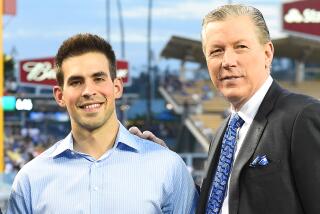Strong-Willed Reporters at Century’s End
- Share via
I have given up trying to convince the illogical, the obtuse and the merely stubborn that the century will not turn at the beginning of the year AD 2000 but at its end. (The 21st Century will begin on Jan. 1, 2001.)
I have already devoted two or three columns to this subject with disappointing results. Most people who think the century will end on Dec. 31, 1999, cannot be dissuaded. In fact, arguments to the contrary seem merely to solidify their error. Their minds are set.
I have had extensive correspondence with a UCLA professor and a Caltech professor emeritus, both of whom are obviously more intelligent than I am; both finally conceded that, the way we count our years, I was right; but both seemed to resent it, and I’m afraid the language became testy on both sides.
Also, I don’t care to begin one of those tedious debates between columnists. I have never allowed myself, for example, to be provoked into a public argument with Herb Caen. For one thing, he’s always right.
I feel obliged to respond, however, to a recent column in the Pasadena Star-News by Charles Cherniss, editor at large, in which he ridiculed me and my friend Charles Chappell for our conviction that the century ends on Dec. 31, 2000.
Cherniss wrote in response to a letter from Chappell that read, in part: “As you probably know and hate to admit, our friend Jack Smith is right and you are wrong about when the next century begins.”
I do not wish to pollute the argument by quoting Cherniss’ reasoning on the question, but he did say that several readers had agreed with him, and added: “Others, more tied to supposed absolutes of math they learned by rote in school, heartily disagree and cite well-respected publications. Like members of the Flat Earth Society, their arguments lie in dogma rather than the logic of empirical reasoning.”
Of all the arguments I have ever heard against Chappell’s point of view, and mine, that is the most fatuous. Dogma? The absolutes of math? It takes nothing but simple arithmetic, and not much of that, to see that the century will end on Dec. 31, 2000. All you have to do is be able to count to 10.
But as I say, I do not want to renew that controversy. I want to challenge Cherniss only on his libel of me and Chappell in implying that when the two of us worked for the downtown Daily News, back in the late 1940s, we were habitually inebriated.
“No surprise that Chuck sides with Jack Smith,” he says. “They were buddies at the old L.A. Daily News back when news-
papermen were two-fisted newspapermen and so were newspaperwomen. According to legend, a constantly replenished bottle of rotgut nestled in each bottom desk drawer, supposedly proving virility.
“Smith, who now writes nostalgically of those days, now brags of being a sipper of fine wines. Publisher Manchester Boddy would have banished him for that. . . . To those at the old Daily News, a journalist was a reporter looking for a job.”
It may be true that I occasionally imbibed as a young reporter. After all, I had seen “The Front Page” and knew how reporters were supposed to act. But I never kept a bottle in my desk. That was Will Fowler (at the Herald-Express), and he drank from it only when guided tours were coming through the city room. It was exactly what the visitors expected.
We did have a city editor, for a time, who never drew a sober breath, and during his regime the whole staff tended to go to hell in a handbasket, to use a phrase favored by the late H. Allen Smith.
But Chappell was a model of abstinence. When Chappell was city editor, and later managing editor, he never took a drink on the job and never showed up tipsy or hung over. I sometimes wonder that he was able to function on that rowdy newspaper. While he was exemplary, he set an example that few of his staff followed.
It may be that few of us were perfectly sober when we put the Daily News to bed, but it was a wonderful paper, full of humor, youthful energy, good writing and irreverence, and all of us knew when the century was going to end.


